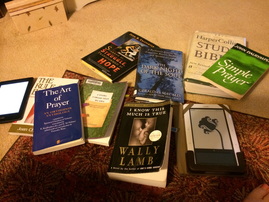
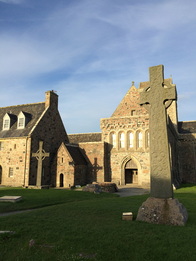 I’ve blogged about the Iona Prayer Circle before. I suppose I could look back and read what I had written, and thus be certain that I was saying something new this time. But blogging doesn’t work that way. We write at the moment and for the moment, which makes new whatever we say. I’ve been a member of the Iona Prayer Circle for years, at least ten. Every two months I receive an email list of people to pray for. The list gives updates and additions. We intercessors are asked to pray once a week, preferably on Tuesday, to coincide with the Service of Healing conducted at the Iona Abbey on the day. My habit has been to ‘pray the list’ every morning. In doing so, I feel I begin to know the people. Not the details of their lives, but we make some connection, soul to soul. Mysterious and inexplicable. By the time I have lifted up each of the fifteen names, I have prayed for most of the conditions that people face in the world. I’ve prayed for people who are bio-polar, depressed, grieving the loss of loved ones, and facing all kinds of medical conditions. I’ve prayed for single moms, alcoholics, and for those who are lonely and feeling purposeless. I’ve prayed for the myriad losses that the elderly face. I’ve painted a rather bleak picture, you might say. Well, yes. The human condition is like that. Just ask Jesus. That’s why the list exist. But the list is also full of hope. The sponsors write of the gratitude and uplifting that their personal friends feel knowing that their nameless friends around the world are praying for them. Jesus offered that, too. 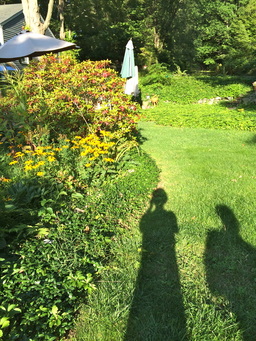 Joan Chittister is one of my favorite contemporary spiritual writers. Here’s a recent comment of hers that resonated with me. “If I do not need other people, what is their own purpose in life…?” More than just resonating, it startled me, activating those dendrites to hop about in my brain. I realized how self-involved I am, always considering my own life purpose, always wanting to be in control, always thinking that other people need me. How difficult it is for me to step into their shoes and consider from their point of view. What an arrogant, privileged position it is to think that everyone needs me, needs my good works. How hard it is to let others do for me. But more than that, what a challenge it is to admit that I need them. How do I change this egocentric attitude of mine? Consciously looking for ways for people do things for me feels patronizing and keeps me in control. Even my question is controlling. I’m open to new relationships of giving and receiving. I have no answers. Let go, let God. Joan Chittister visionviewpoint@benetvision.org  “Here’s the thing, say Shung. The thing I believe. God is inside you and inside everybody else. You come into the world with God. But only them that search for it inside find it and sometimes it just manifest itself even if you not looking or don’t know what you’re looking for. Trouble do it for most folks, I think. Sorrow, lord.” This idea of faith is puzzling, no getting around it. Maybe some of my questions resonate with you. Why do I have faith, while others claim to be atheist or agnostic? Why do I go to MCC and not to another church? Why am I Christian, not Jewish or Muslim? Why is my faith not as strong as someone else's? Then there is Shung’s comment about faith in Alice Walker’s, The Color Purple (quoted by Gerald G. May in The Dark Night of the Soul.) Why can’t I express belief in God as succinctly, and from the heart, as she does? I’m probably missing the point, not in asking the questions, but in expecting answers. I’m thinking that the answers are in the questions and in the questioning. After all, answers to questions of faith are never definitive: we’re not talking about science here! 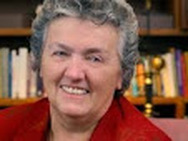 This piece, by Joan Chittister, appeared in “Vision and Viewpoint, an e-newsletter for spiritual seekers and kindred spirits.” visionviewpoint@benetvision.org –from Joan Chittister: Essential Writings, selected by Mary Lou Kownacki and Mary Hembrow Snyder (Orbis). A person of prayer The person who learns to pray with the heart of God has no patience for injustice anywhere. They see with the prophet’s eye. They break down national boundaries. They transcend gender roles. They have no sense of color or caste, of wealthy or poor. They see only humanity in all its glory, all its pain. The person of prayer is not a person of private agendas. The more we become like God, the greater-hearted we become as well. We have no sense anymore of “we and they” or “them and us” or “me and mine.” Now our hearts open to take in the heart of the world. When, in prayer, we come to discover God’s universal love we suddenly realize that God does not take sides, that we have no priority on God alone. We finally understand that the God we seek is the God of the world and so, to seek that God, we must develop hearts as big as the world ourselves. Then, racism makes no sense and sexism is as much a sin as any other kind of discrimination, and war is blasphemy against humanity. Then we become bigger than our single nation, broader than any one religion, truly catholic—universal—in our cares and beliefs and commitments. To develop a cosmic heart is a moment of profound transformation. We can never be the same again. We are beyond the boundaries we have created to separate the human race into my race and theirs. Then prayer becomes truly co-creative. Otherwise prayer is nothing more than some kind of spiritual spa designed to make me feel good. It is reduced to an exercise the intent of which is to assure me of my own value. It swaddles me in self-righteousness and self-serving. It makes God an icon, a tribal God whose concerns are no bigger than our own. Then God carries a flag, becomes a male potentate, excludes females and passes out personal gifts. Then we make ourselves God and our God a poor, miserable creature indeed—a national patriot, maybe; a great male warrior, perhaps, but certainly not the God of all creation. Then we are simply worshipping ourselves and calling it prayer. 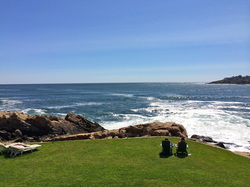 Have you noticed that in the Gospels Jesus appears for a while and then disappears. We read about him feeding a crowd, and next thing we know, he as slipped into a boat and hidden on the other side of the lake. He refuses to go to Jerusalem with his disciples, but then makes the journey alone and appears in the temple. There are plenty of examples; just look of them. My first response is that Jesus does the same with me, but I’m apt to blame myself for forgetting about him. Thus he disappears. I know that I’m not in control of all of his appearing and disappearing, but I do play a part when I get involved in my own agenda, an agenda that doesn’t include Jesus. But I’m also considering that this now-you-see-him, now-you-don’t modus operandi of Jesus could be of his doing. He can’t be with us every minute, telling us what do to, leading us by the hand. We’re left alone to try things out on our own, and then Jesus reappears to help us check out how we’re doing. So many possibilities to ponder, but when all is said and done, I remember my favorite, which is the container that holds them all. “And remember, I am with you always, to the end of the age” (Matt. 28:20b). 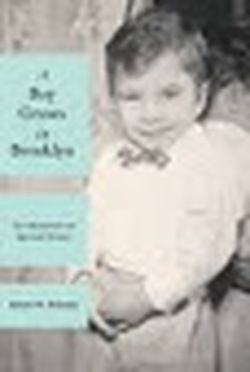 Bob Pazmino, my professor of Christian education at Andover Newton Theological School, has written a marvelous memoir. It’s a humorous, honest, faithful story of his days growing up in Brooklyn. He offers many nuggets to ponder. How about this one? “The weekly commitment to church attendance is a critical issue if church life is to be formative in the lives of both youth and adults.” How do we make this happen? Can we make it happen? Should it be our goal? Is the idea that weekly church attendance, and belief in Jesus as the Christ, an idea of the past, now relegated to the archives? There are many situations to ponder. Here’s one. I was brought up in a church-going family. All four of us went to church each Sunday with both of our parents. And yet, only the two oldest continue to attend church. The younger two (six years younger) are good people, but they have no part in church, or to my knowledge, in the Christian faith. This makes me wonder what effect the times in which we were raised has to do with church going and belief. My older sister and I were children of the fifties; my younger sister and brother of the sixties. I believe that my weekly church attendance as a child made an important difference in my current involvement in church, and in my intentional journey as a person of faith. I agree with Bob that weekly church attendance is crucial for faith formation. But, this isn’t happening. What does it mean to individuals and to Christianity? Can the world express Christ’s message of love without intentional prayer and without opening up to the Holy Spirit? If God is still speaking, how will we hear God if we don’t take the time to listen. Church is one of the best places for that. 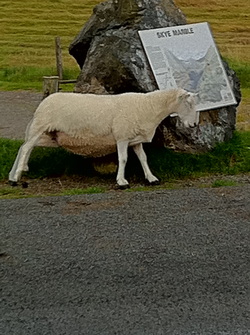 When I find myself telling God what to do, the response I usually hear is God telling me what to do. God doesn’t parrot back; God doesn’t just change the pronouns and leave it at that. God may direct me toward some physical action, such as to pay a visit or make a meal. But often, all I hear is that still small voice saying, “Be peaceful; let go, let God.”  If you haven’t read Anne Lamott’s response to the death of Robin Williams, here it is. She always writes the truth. This will not be well written or contain any answers or be very charming. I won't be able to proof read it It is about times like today when the abyss is visible and we cannot buy cute area rugs at IKEA to truck out the abyss. Our brother Robin fell into it yesterday. We are all staring at the abyss today. I called my Jesuit friend the day after the shootings in Newtown, stunned, flat, fixated, scared to death: "Is there any meaning in the deaths of twenty 5 and 6 year old children?" Tom said, "Not yet." And there is no meaning in Robin's death, except as it sheds light on our common humanity, as his life did. But I've learned that there can be meaning without things making sense. Here is what is true: a third of the people you adore and admire in the world and in your families have severe mental illness and/or addiction. I sure do. I have both. And you still love me. You help hold me up. I try to help hold you up. Half of the people I love most have both; and so do most of the artists who have changed and redeemed me, given me life. Most of us are still here, healing slowly and imperfectly. Some days are way too long. And I hate that, I want to say. I would much prefer that God have a magic wand, and not just a raggedy love army of helpers. Mr. Roger's mother told him when he was a boy, and a tragedy was unfolding that seemed to defy meaning, "Look to the helpers." That is the secret of life, for Robin's family, for you and me. I knew that those children at Sandy Hook were caught in God's loving maternal arms at the second each crossed over, and the teachers were, too. I believe the shooter was too, another child of God with severe mental illness, because God loves, period. But this is controversial. I know Robin was caught too, in both the arms of God, and of his mother, Laurie. I knew them both when I was coming up, in Tiburon. He lived three blocks away on Paradise drive. His family had money; ours didn't. But we were in the same boat--scared, shy, with terrible self esteem and grandiosity. If you have a genetic predisposition towards mental problems and addiction, as Robin and I did, life here feels like you were just left off here one day, with no instruction manual, and no idea of what you were supposed to do; how to fit in; how to find a day's relief from the anxiety, how to keep your beloved alive; how to stay one step ahead of abyss. We all thought after Newtown that gun control legislation would be passed, but no--not one new law. We think in the aftermath of Robin's death that there will be consciousness raising about mental health, but I doubt it. The shock and awe will pass, like it did after Phillip Seymour Hoffman's death. Unless...unless we take action. But what? I don't have a clue. Well, here's Glenn Close's astonishing organization to raise awareness and diminish the stigma of mental illness, where you can give OR receive help: http://www.bringchange2mind.org/ Go there, OK? In Newtown, as in all barbarity and suffering, in Robin's death, on Mount Sinjar, in the Ebola towns, the streets of India's ghettos, and our own, we see Christ crucified. I don't mean that in a nice, Christian-y way. I mean that in the most ultimate human and existential way. The temptation is to say, as cute little believers sometimes do, Oh it will all make sense someday. The thing is, it may not. We still sit with scared, dying people; we get the thirsty drinks of water. This was at theologian Fred Buechner blog today: "It is absolutely crucial, therefore, to keep in constant touch with what is going on in your own life's story and to pay close attention to what is going on in the stories of others' lives. If God is present anywhere, it is in those stories that God is present. If God is not present in those stories, then they are scarcely worth telling." Live stories worth telling! Stop hitting the snooze button. Try not to squander your life on meaningless, multi-tasking bullshit. I would shake you and me but Robin is shaking us now. Get help. I did. Be a resurrection story, in the wild non-denominational sense. I am. If you need to stop drinking or drugging, I can tell you this: you will be surrounded by arms of love like you have never, not once, imagined. This help will be available twenty/seven. Can you imagine that in this dark scary screwed up world, that I can promise you this? That we will never be closed, if you need us? Gravity yanks us down, even a man as stunning in every way as Robin. We need a lot of help getting back up. And even with our battered banged up tool boxes and aching backs, we can help others get up, even when for them to do so seems impossible or at least beyond imagining. Or if it can't be done, we can sit with them on the ground, in the abyss, in solidarity. You know how I always say that laughter is carbonated holiness? Well, Robin was the ultimate proof of that, and bubbles are spirit made visible. 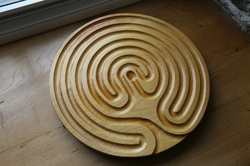 Photo by Rosie Perera Photo by Rosie Perera Sometimes, like right now, I sit down without a clue as to what I’m going to write about. God, my faith, prayer are always on my mind and in my heart so I trust that something will appear on the screen as I tap away. Ah, and there it is, that very idea that my life has become more and more surrounded, led, and challenged by God thoughts. Well, let’s delete the word thoughts and just leave it at God. It is God who challenges, not my thoughts. This isn’t to say that I don’t think un-godlike thoughts or don’t act in surly ways, but more and more quickly God calls out to me and pulls me back to deal with it all. Try as I might, I can’t get away from God very easily or for very long. It's grace. |
Contact me
bobbifisher.mac@mac.com Archives
August 2023
Categories
All
|
 RSS Feed
RSS Feed